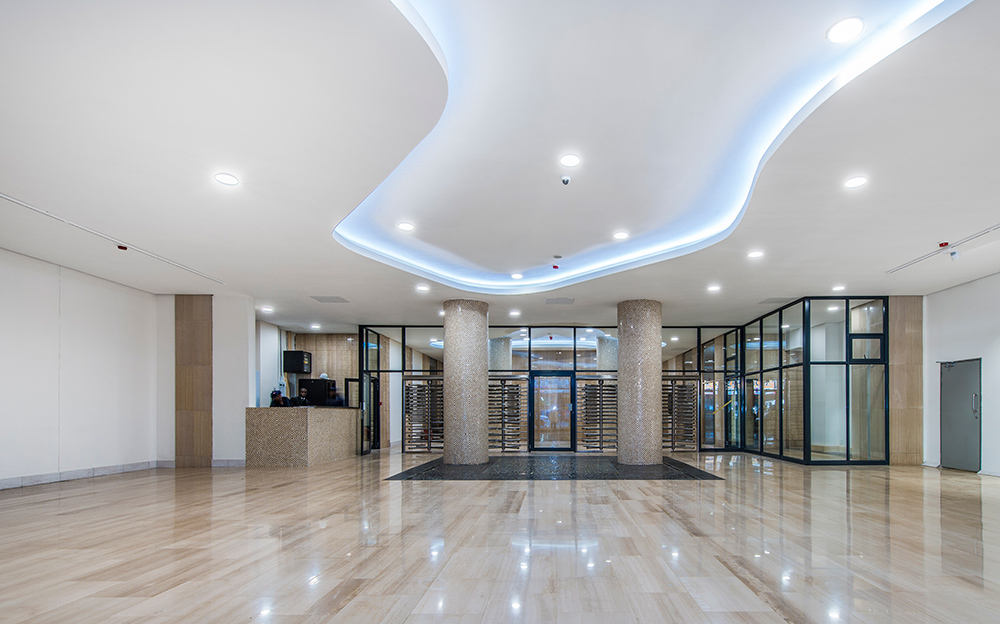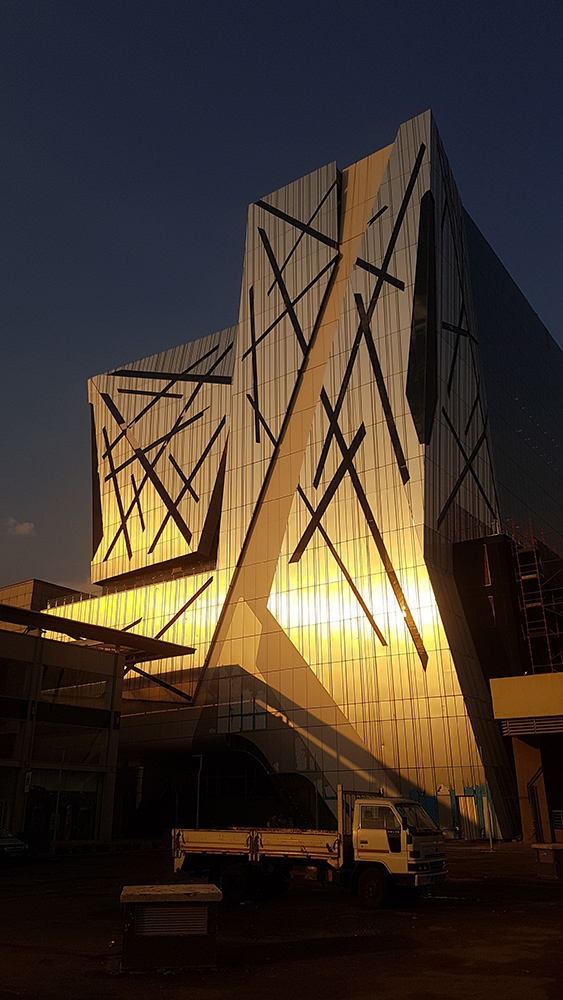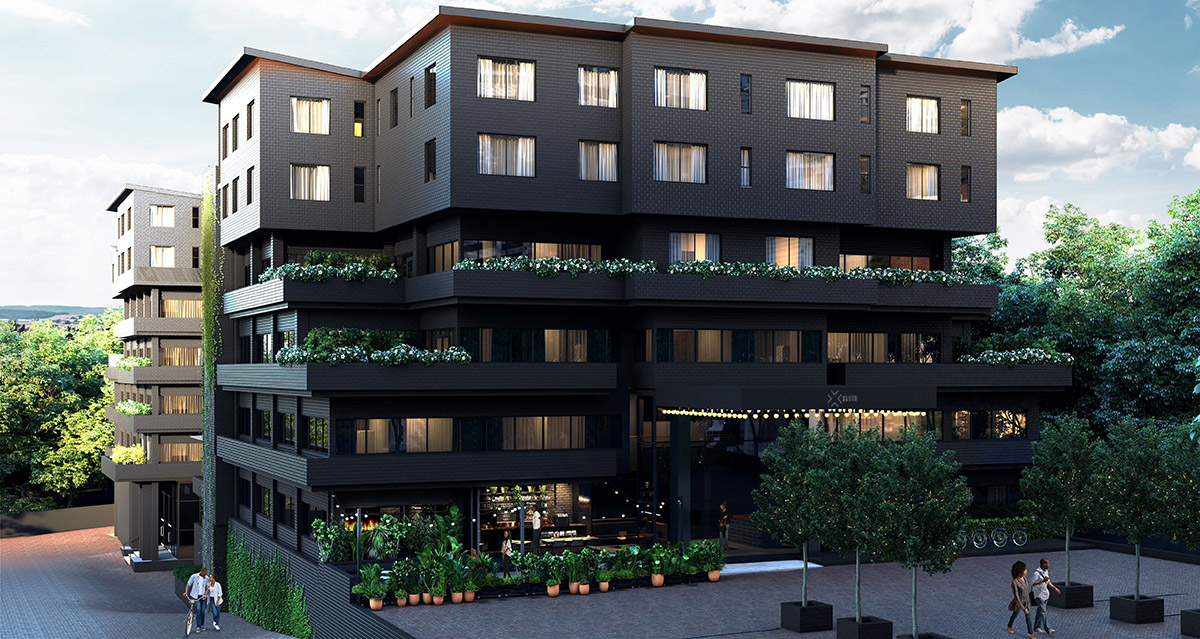MAIN IMAGE: Estelle Meiring, Paragon group director; Jonathan Kohler, Lansdowne Property CEO.
Right in line with global trends, many empty office buildings in Johannesburg CBD have been turned into affordable apartments and property developers are confident the trend is spreading to more cities in the country.
The Shell House in downtown Johannesburg achieved iconic status as the first headquarters of the ANC after it’s unbanning in 1990 and it’s where Nelson Mandela planned the democratic takeover of the country. Twenty years later the building had fallen into disrepair and was almost empty except for a couple of vendors on the ground floor. It was considered an ‘eye-sore’ even by the ANC who sold the building in 2015.
Today it is a 563-unit low-cost residential development with only a 5% vacancy rate and is considered to have played a vital role in the rejuvenation of the Johannesburg inner city.

Repurposing existing buildings is a growing trend, like Shell House in Johannesburg.
Shell House is a prime example of a popular trend to turn empty office buildings in the city’s CBD into affordable housing units. The architect firm who undertook the Shell House project is Paragon Architects South Africa (PASA). In a recent statement their group director, Estelle Meiring, said she thinks there will be a lot of repurposing of buildings in high-end precincts as has been happening in Johannesburg. PASA recently opened a regional office in Cape Town’s Waterfront and Meiring says she thinks Cape Town is going to outperform most of the other big cities in the next few years.
This is in line with international trends. In England the Local Government Association estimates that more than half of all new homes in some areas have been created by offices being converted into flats by developers.
There are lots of empty office buildings in our big cities. The slow economy and continued political uncertainty has slowed activity in all sectors of the property market, but the office space sector has been hardest hit with massive vacancies. Meiring said it is the biggest under-performer at the moment.
Technology is another key factor in the decline in demand for office space. Thanks to the internet people can work from home or a coffee shop or a shared workspace. The local demand for the latter is growing so fast that international brands like US giant WeWork, a real estate company that supplies shared workspaces, are setting up shop in the country.

WeWork has taken up five floors in the Paragon-designed The Link building in Rosebank.
“The more we interact online, the greater our need for human interaction. In terms of the office of the future, this is unlikely to change. People need to meet, interact, brainstorm and collaborate. And that is what these spaces are about,” says Meiring.
She explains the trend going forward will be about communal spaces which is why we are seeing an increasing trend for mixed-use precincts. Meiring says the communal living market will be an interesting trend to watch where people have a very small living space, but then the building itself has a lot of communal spaces and facilities. “This also plays into the affordability trend, as it gives people access to a whole range of additional amenities,” she says.
A local example of such an initiative would be BlackBrick’s project in Sandton, where they are converting the offices of the former home of beer giant SAB into 208 furnished apartments. Tenants will also have access to the property’s facilities which will include a café, workspaces and board rooms, a boxing gym, library and a meditation garden. Apartments are expected to start selling from R995 000 upwards or offer rentals from R8 000 per month which is ‘considered cheap’ for Sandton.

An artist impression of the entrance to the BlackBrick apartment complex in Sandton.
Lansdowne Property CEO Jonathan Kohler says the private property market is playing catch-up locally with the global trend towards an integrated living and working environment. He says there are 16 new developments currently underway in Rosebank, one of these is their project, 100 Oxford, with apartments ranging from the R1.6-m to R4-m mark.
Kohler gives four reasons why upmarket apartments are appealing to buyers:
Urban living on the rise
People are wanting to live, work and relax in one space to create a balance – it’s a very workable solution for the many international and domestic in-bound travelling executives who need to settle for 3 – 6 month contracts close to work. “The lock-up-and-go appeal of investing in an apartment accommodates this lifestyle with lucrative rental opportunities,” says Kohler.
Rocking the rentals
There is an increase in Joburg execs relocating their families to Cape Town and choosing to fly in weekly to work in Sandton and Rosebank. Whether private investors buy apartments like these to rent, or corporates buy into an apartment to house their international contract execs, he has no doubt that a Rosebank property will appreciate substantially in the coming 5 – 10 years.
Winds of change
There’s talk of the property market finally starting to bottom out, but even if this is the start of an uptick or not, the interest rates are as low as they are going to go, and building costs are not going to get any cheaper – in fact they’ll go up despite what the market is doing. “The point is, the business district is central to the Rosebank and Sandton zones – this is not going to change, it’s a landmark area,” says Kohler. “As the economy strengthens, the prices of urban city properties are going to shoot up.”
Mobility without the drive
The global trend is for new sustainable precincts to lean towards a pedestrian-focussed movement, not a vehicular one. “While there will always be room for cars in the smart cities of the world, the appeal of greener less congested cityscapes holds huge appeal, where young professionals and visiting execs don’t have to use a car to get around,” says Kohler.
Conclusion
It is clear that South Africa is picking up on international trends in terms of the repurposing of empty office buildings into affordable housing units in the central business areas of our cities. This is in line with the growing demand for affordable housing options in our urban areas. A trend to keep an eye on.
You are welcome to share your thoughts and comments. Send an email to editor@propertyprofessional.co.za.








